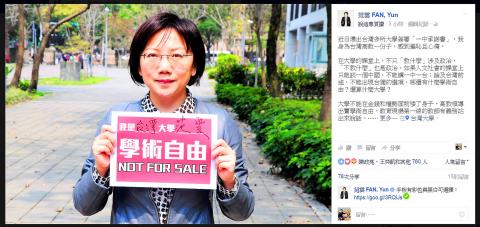A Taiwanese professor on Sunday launched a petition to protect academic freedom following allegations last week that a majority of the nation’s universities signed letters agreeing to censor topics Beijing deems offensive.
Shih Hsin University on Thursday last week was accused of signing a letter promising Chinese universities that its faculty would not discuss sensitive political topics in classes offered to Chinese exchange students, such as “one China, one Taiwan,” “two Chinas” and Taiwanese independence.
The Ministry of Education said a preliminary investigation revealed that at least 80 Taiwanese universities have signed similar agreements and that a full investigation is to be conducted in the next two weeks.

Photo: screengrab from Facebook
Fan Yun (范雲), a National Taiwan University sociology professor and the Social Democratic Party (SDP) convener, called on professors to petition against political restrictions imposed on them by universities.
“As a teacher in Taiwanese higher education, I feel ashamed and heartbroken. In a university classroom, what one teaches and refrains from teaching are both political actions. If humanities education … is obliged to negate Taiwanese independence in discussions about Taiwan’s future, we have no such thing as academic freedom in universities,” she said on Facebook.
Fan said the scandal is a “crisis of Taiwanese democracy,” adding that universities have a duty to safeguard academic discourse and research freedoms, but the incident shows that half the nation’s institutions are prepared to sacrifice those principles.
“There is no such thing as apolitical academic discourse. Marking any topic as beyond the pale of learning or discussion is in itself politically manipulative,” she said, adding that universities that do not honor academic freedom are “no better than counterfeit food products.”
A number of university faculties and student organizations have participated in Fan’s movement by signing the petition and posting photographs displaying their names, institutions and the message “academic freedom is not for sale.”
Former Shih Hsin University president Lai Ting-ming (賴鼎銘) and professor Chen Cheng-liang (陳政亮), have signed the petition.
The National Taiwan University Student Association and the National Taiwan University Graduate Student Association issued a joint statement condemning the agreements, saying that they compromise academic freedom, limit exchange students learning experience and destroy the integrity of cross-strait academic exchanges.
“Academic freedom is a right guaranteed by the University Act (大學法) and should not be abridged because university administrators are afraid of China,” they said.
Resurrecting censorship on campus is offensive to the democracy advocates and dissidents who died during the Martial Law era, they added.

Civil society groups yesterday protested outside the Legislative Yuan, decrying Chinese Nationalist Party (KMT) efforts to pass three major bills that they said would seriously harm Taiwan’s democracy, and called to oust KMT caucus whip Fu Kun-chi (傅?萁). It was the second night of the three-day “Bluebird wintertime action” protests in Taipei, with organizers announcing that 8,000 people attended. Organized by Taiwan Citizen Front, the Economic Democracy Union (EDU) and a coalition of civil groups, about 6,000 people began a demonstration in front of KMT party headquarters in Taipei on Wednesday, organizers said. For the third day, the organizers asked people to assemble

Taipei is participating in Osaka’s Festival of Lights this year, with a 3m-tall bubble tea light installation symbolizing Taiwan’s bubble tea culture. The installation is designed as a bubble tea cup and features illustrations of Taipei’s iconic landmarks, such as Taipei 101, the Red House and North Gate, as well as soup dumplings and the matchmaking deity the Old Man Under the Moon (月下老人), affectionately known as Yue Lao (月老). Taipei and Osaka have collaborated closely on tourism and culture since Taipei first participated in the festival in 2018, the Taipei City Department of Information and Tourism said. In February, Osaka represented

POOR IMPLEMENTATION: Teachers welcomed the suspension, saying that the scheme disrupted school schedules, quality of learning and the milk market A policy to offer free milk to all school-age children nationwide is to be suspended next year due to multiple problems arising from implementation of the policy, the Executive Yuan announced yesterday. The policy was designed to increase the calcium intake of school-age children in Taiwan by drinking milk, as more than 80 percent drink less than 240ml per day. The recommended amount is 480ml. It was also implemented to help Taiwanese dairy farmers counter competition from fresh milk produced in New Zealand, which is to be imported to Taiwan tariff-free next year when the Agreement Between New Zealand and

Taiwanese professional baseball should update sports stadiums and boost engagement to enhance fans’ experience, Chinese Professional Baseball League (CPBL) commissioner Tsai Chi-chang (蔡其昌) told the Liberty Times (sister paper of the Taipei Times) in an interview on Friday. The league has urged Farglory Group and the Taipei City Government to improve the Taipei Dome’s outdated equipment, including relatively rudimentary television and sound systems, and poor technology, he said. The Tokyo Dome has markedly better television and sound systems, despite being 30 years old, because its managers continually upgraded its equipment, Tsai said. In contrast, the Taipei Dome lacked even a room for referees